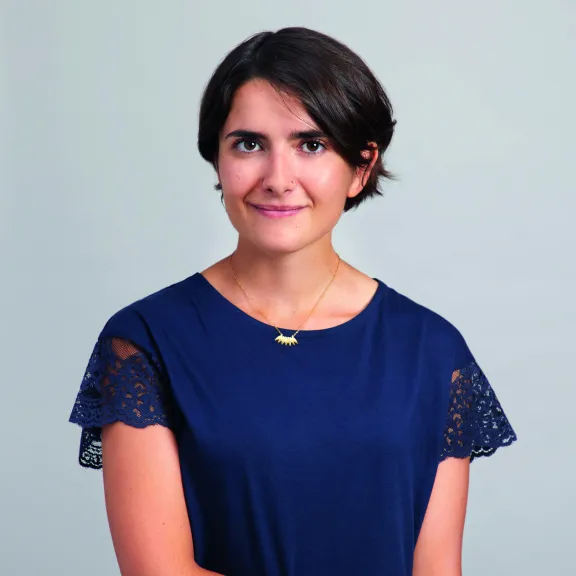Flavie Coquel Understanding the link between DNA replication and immune response to find new cancer therapies
Flavie Coquel, post-doctoral fellow, École Polytechnique Fédérale de Lausanne (Switzerland), Global Health Institute, under the supervision of Professor Andrea Ablasser
- 2019 • Bettencourt Prize for Young Researchers

The 2019 Bettencourt Prize for Young Researchers was awarded to Flavie Coquel, post-doctoral fellow, for her research on innovative cancer therapies.
A new link between DNA replication and inflammation
"For a cell to divide, it must first duplicate its genetic material. This process is called DNA replication. During this stage, thousands of replication forks copy the two meters of DNA in the nucleus. These forks are frequently stopped by various obstacles, creating stress. I wanted to understand how the cell responds to the stopping of the replication forks and how this response can be useful in cancer therapy.” "“My area of research is meiosis, the cell division process that produces the eggs and sperm necessary for sexual reproduction. I studied the different errors that can occur during the formation of oocytes to understand developmental diseases in children. I am now studying chromosome organization mechanisms during mitotic divisions, a process of cell division common to all the cells in our body that allows tissue renewal.”
Flavie Coquel has identified a new role for the SAMHD1 protein, initially known for its antiviral role against HIV. She demonstrated that SAMHD1 promotes DNA repair and that there is a direct link between DNA damage response mechanisms and inflammation. At the same time, using plant extracts from traditional Chinese pharmacopoeia, she identified two new molecules that prevent cancer cell division. Her work is expected to be patented, paving the way for the development of innovative cancer therapies.
As a post-doctoral fellow, Dr. Coquel works on innate immunity sensors that recognize DNA in the cell in physiological or pathological conditions. She is trying to better understand how the sensing system can regulate the response to DNA damage and cell proliferation. This area of research is gaining ground in the study of cancer and age-related diseases.
Flavie Coquel in a few words
2014: Biological engineering, Compiègne University of Technology
2018: Doctoral dissertation: “The role of SAMHD1 in response to replicative stress and the production of type I interferons" under the supervision of Dr Philippe Pasero and Dr Yea-Lih Lin, Maintenance of Genome Integrity during Replication Unit, Institute of Human Genetics, University of Montpellier Chemical and Biological Health Sciences Graduate School - Biology Section
Post-doctorate under the supervision of Professor Andrea Ablasser, École Polytechnique Fédérale de Lausanne (Switzerland), Global Health Institute
Bettencourt Prize for Young Researchers
Created in 1990, the Bettencourt Prize for Young Researchers is one of the first initiatives of the Fondation Bettencourt Schueller. Until 2021, this prize was awarded each year to 14 young doctors of science or doctors of medicine, to enable them to carry out their post-doctoral stay in the best foreign laboratories. 349 young researchers were distinguished. The prize endowment was €25,000.
All the award-winners